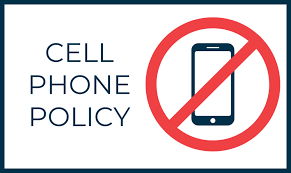These days, almost every student has a phone, and honestly, it feels impossible to go without one. We use them to text, scroll on social media, listen to music, or just keep in touch with family, but in school, phones can get pretty distracting, which is why there are rules about them. The cell phone policy is basically the school’s way of saying when we can and can’t use our phones, trying to keep us focused in class, but still letting us have them when we need them.
When the school first announced the new cell phone policy, students had a lot of different reactions. Some people were upset and felt like it was unfair, but some didn’t mind the policy, saying things like, “Not great, I am my dad’s personal accountant and the one who helps him with translating, so communicating with him at school isn’t easy and makes everything hard having to just excuse me out of school,” said Amy Herrera.
Others thought it might actually help them in the long run. A few even admitted that without their phones, they are paying more attention in class. For example, Leila Buenrrostro said “I feel like having a phone in class can be a distraction if it’s going off like crazy just bothering you to open it, but if you have it on you and you’re not obviously using it, I mean, you’re doing your work and you have all your work completed, I see no problem having your phone. There should be no issue about it if it’s not bothering anybody; then it shouldn’t bother anybody at all. I just find it unreasonable to even have a phone privilege or phone restriction at school.” Even though not everyone agrees with the rule, it’s clear that the policy has made a big difference in how students act during class and how much they focus on schoolwork.
Teachers have noticed a change, too, and most of them seem to think the policy is making a difference. Some teachers believe students are now more engaged in lessons because they aren’t constantly distracted by their phones. One teacher explained how students get distracted in class, and he said, “Absolutely, if only 20 percent is focused on their phone, then only 80 percent is focused in class, but you should have 100 percent attention in class and not your phone,” said Mr. French. Others see the policy as a way to bring back more face-to-face interactions in the classroom, instead of students hiding behind screens. Even though some students don’t like the rule, many teachers argue that it’s helping kids stay more on task and participate more during class discussions.
Security staff also see the benefits of the cell phone policy. They believe that when students aren’t glued to their phones, it makes the school safer overall. One security pointed out, “I think for us adults, yes, but not for the students, because the students usually do one small thing, they put it on social media. Social media is a big platform, and so they like it spreads around quickly. Some are false accusations, some spoiled information. So, like adults, yeah, because we know what’s going on, it’s a good thing for adults to have phones, but not students,” said security guard Jose, saying that security also notices how well or not well they actually follow the policy.
“I mean, all students do follow rules, but there are some students who try to be like they think they know more than the adults, so that’s when they decide not to follow,” security guard Jose said. “While some students may try to sneak their phones, most of them end up following the rule, which helps the school run more smoothly.”
Therefore, having a clear cell phone policy is important because it helps students stay focused and respectful during class. It creates fewer distractions and makes it easier for everyone to learn. While phones can be useful for emergencies or learning, they should be used responsibly so the classroom stays a positive place for everyone.








